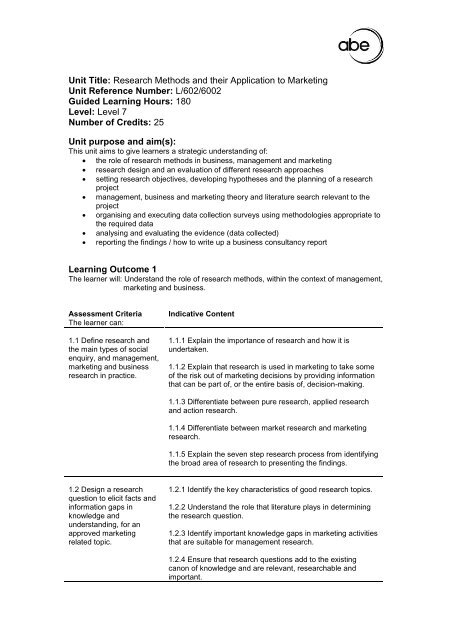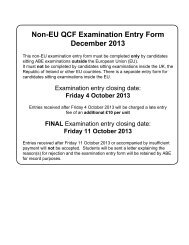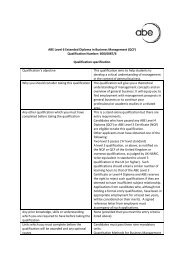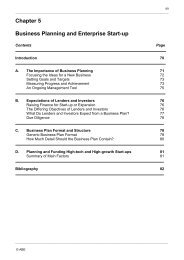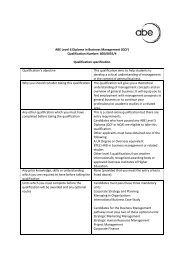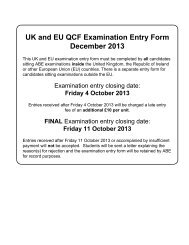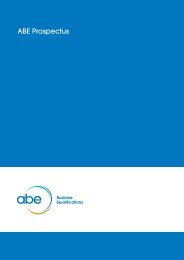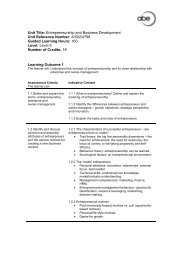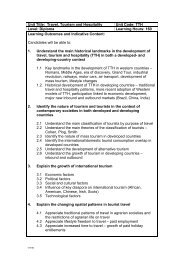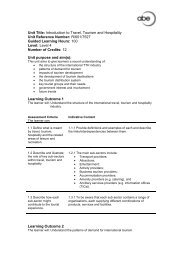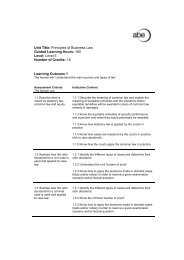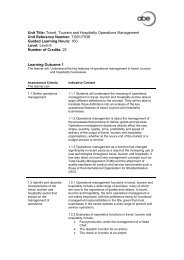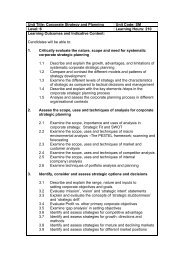Unit Title: Research Methods and their Application to Marketing
Unit Title: Research Methods and their Application to Marketing
Unit Title: Research Methods and their Application to Marketing
Create successful ePaper yourself
Turn your PDF publications into a flip-book with our unique Google optimized e-Paper software.
<strong>Unit</strong> <strong>Title</strong>: <strong>Research</strong> <strong>Methods</strong> <strong>and</strong> <strong>their</strong> <strong>Application</strong> <strong>to</strong> <strong>Marketing</strong><br />
<strong>Unit</strong> Reference Number: L/602/6002<br />
Guided Learning Hours: 180<br />
Level: Level 7<br />
Number of Credits: 25<br />
<strong>Unit</strong> purpose <strong>and</strong> aim(s):<br />
This unit aims <strong>to</strong> give learners a strategic underst<strong>and</strong>ing of:<br />
the role of research methods in business, management <strong>and</strong> marketing<br />
research design <strong>and</strong> an evaluation of different research approaches<br />
setting research objectives, developing hypotheses <strong>and</strong> the planning of a research<br />
project<br />
management, business <strong>and</strong> marketing theory <strong>and</strong> literature search relevant <strong>to</strong> the<br />
project<br />
organising <strong>and</strong> executing data collection surveys using methodologies appropriate <strong>to</strong><br />
the required data<br />
analysing <strong>and</strong> evaluating the evidence (data collected)<br />
reporting the findings / how <strong>to</strong> write up a business consultancy report<br />
Learning Outcome 1<br />
The learner will: Underst<strong>and</strong> the role of research methods, within the context of management,<br />
marketing <strong>and</strong> business.<br />
Assessment Criteria<br />
The learner can:<br />
1.1 Define research <strong>and</strong><br />
the main types of social<br />
enquiry, <strong>and</strong> management,<br />
marketing <strong>and</strong> business<br />
research in practice.<br />
Indicative Content<br />
1.1.1 Explain the importance of research <strong>and</strong> how it is<br />
undertaken.<br />
1.1.2 Explain that research is used in marketing <strong>to</strong> take some<br />
of the risk out of marketing decisions by providing information<br />
that can be part of, or the entire basis of, decision-making.<br />
1.1.3 Differentiate between pure research, applied research<br />
<strong>and</strong> action research.<br />
1.1.4 Differentiate between market research <strong>and</strong> marketing<br />
research.<br />
1.1.5 Explain the seven step research process from identifying<br />
the broad area of research <strong>to</strong> presenting the findings.<br />
1.2 Design a research<br />
question <strong>to</strong> elicit facts <strong>and</strong><br />
information gaps in<br />
knowledge <strong>and</strong><br />
underst<strong>and</strong>ing, for an<br />
approved marketing<br />
related <strong>to</strong>pic.<br />
1.2.1 Identify the key characteristics of good research <strong>to</strong>pics.<br />
1.2.2 Underst<strong>and</strong> the role that literature plays in determining<br />
the research question.<br />
1.2.3 Identify important knowledge gaps in marketing activities<br />
that are suitable for management research.<br />
1.2.4 Ensure that research questions add <strong>to</strong> the existing<br />
canon of knowledge <strong>and</strong> are relevant, researchable <strong>and</strong><br />
important.
1.3 Explore the main<br />
research philosophies of<br />
positivism <strong>and</strong><br />
phenomenology <strong>and</strong><br />
evaluate the benefits <strong>and</strong><br />
limitations of each.<br />
1.3.1 Appreciate the long st<strong>and</strong>ing debate about positivism<br />
<strong>and</strong> phenomenology.<br />
1.3.2 Explain positivism.<br />
1.3.3 Explain phenomenology.<br />
1.3.4 Appraise the main features of the positivistic <strong>and</strong><br />
phenomenological paradigms <strong>and</strong> <strong>their</strong> limitations.<br />
Learning Outcome 2<br />
The learner will: Be able <strong>to</strong> compare <strong>and</strong> contrast research methodologies that relate <strong>to</strong><br />
management, business <strong>and</strong> marketing research.<br />
Assessment Criteria<br />
The learner can:<br />
2.1 Distinguish between<br />
qualitative <strong>and</strong> quantitative<br />
research methodologies.<br />
Indicative Content<br />
2.1.1 Explain qualitative research methodologies.<br />
2.1.2 Explain quantitative research methodologies.<br />
2.1.3 Be able <strong>to</strong> critically evaluate both methodologies.<br />
2.1.4 Explain why particular research methodologies are<br />
selected.<br />
2.2 Explore qualitative<br />
approaches <strong>and</strong> evaluate<br />
the various techniques<br />
available <strong>and</strong> the<br />
limitations of the<br />
methodology.<br />
2.2.1 Explain that qualitative research does not subject the<br />
research findings <strong>to</strong> quantification or quantitative analysis but it<br />
seeks <strong>to</strong> examine attitudes, feelings <strong>and</strong> motivation <strong>and</strong> is<br />
generally characterised by small samples.<br />
2.2.2 Explain that the main limitations are that it is not generally<br />
representative of the target market <strong>and</strong> much depends upon the<br />
skills of the researcher.<br />
2.2.3 Appreciate the techniques used which include focus<br />
groups <strong>and</strong> interviews <strong>and</strong> be able <strong>to</strong> use these techniques in<br />
the research project.<br />
2.3 Explore quantitative<br />
approaches <strong>and</strong> evaluate<br />
the various techniques<br />
available <strong>and</strong> the<br />
limitations of the<br />
methodology.<br />
2.3.1 Explain that quantitative research involves analysing<br />
numerical data <strong>and</strong> the construction of statistical models in an<br />
attempt <strong>to</strong> explain what has been observed.<br />
2.3.2 Explain that the main techniques are questionnaires <strong>and</strong><br />
interviews <strong>and</strong> be able <strong>to</strong> use these techniques in the research<br />
project.<br />
2.3.3 Be aware of the main limitations of quantitative methods<br />
which include the limited ability <strong>to</strong> probe answers <strong>and</strong> that such<br />
research tends <strong>to</strong> be expensive <strong>to</strong> undertake.
2.3.4 Underst<strong>and</strong> mixed methodologies <strong>and</strong> the principle of<br />
triangulation <strong>and</strong> validation.<br />
Learning Outcome 3<br />
The learner will: Be able <strong>to</strong> develop research designs from quantitative <strong>and</strong> qualitative<br />
perspectives.<br />
Assessment Criteria<br />
The learner can:<br />
3.1 Appreciate the basic<br />
principles of research<br />
design with respect <strong>to</strong><br />
objectives, plans, actions,<br />
review <strong>and</strong> reporting.<br />
Indicative Content<br />
3.1.1 Appreciate the practicalities of research <strong>and</strong> be able <strong>to</strong><br />
turn a research idea in<strong>to</strong> a manageable proposition.<br />
3.1.2 Be able <strong>to</strong> identify a research <strong>to</strong>pic or activity <strong>and</strong><br />
undertake a thorough review of the available literature.<br />
3.1.3 Be able <strong>to</strong> identify <strong>and</strong> construct a research question.<br />
3.1.4 Be able <strong>to</strong> determine appropriate research<br />
methodologies.<br />
3.1.5 Identify the data requirement <strong>and</strong> be able <strong>to</strong> collect <strong>and</strong><br />
analyse it.<br />
3.1.6 Be able <strong>to</strong> draw conclusions, make recommendations<br />
<strong>and</strong> report the outcomes.<br />
3.2 Explore the literature <strong>to</strong><br />
constructively critique both<br />
quantitative <strong>and</strong> qualitative<br />
methodologies <strong>to</strong> support<br />
the research hypotheses.<br />
3.2.1 Undertake a fully referenced literature review of the<br />
broad area of study.<br />
3.2.2 Identify any gaps or limitations in the literature.<br />
3.2.3 Explain how the proposed research will add <strong>to</strong> the<br />
current canon of knowledge.<br />
3.2.4 Write up a comprehensive literature review that supports<br />
the arguments or counter agreements, moves current<br />
underst<strong>and</strong>ing forward <strong>and</strong> demonstrates how the research<br />
will add <strong>to</strong> the current body of knowledge.<br />
Learning Outcome 4
The learner will: Be able <strong>to</strong> set research objectives <strong>and</strong> plan a research project.<br />
Assessment Criteria<br />
The learner can:<br />
4.1 Develop research<br />
objectives <strong>and</strong> identify the<br />
main headings for a<br />
research project.<br />
Indicative Content<br />
4.1.1 Set clear research objectives.<br />
4.1.2 Appreciate the main headings of a research project.<br />
Whilst formats may vary, the following format is typical:<br />
Introduction, background, rationale<br />
Literature review<br />
The research question<br />
The research methodology<br />
Analysis <strong>and</strong> results<br />
Conclusions, recommendations <strong>and</strong> limitations<br />
Referencing <strong>and</strong> bibliography<br />
Appendices<br />
4.2 Identify <strong>and</strong> define a<br />
marketing related research<br />
problem or issue,<br />
document the background<br />
<strong>and</strong> describe the context of<br />
the research.<br />
4.2.1 Identify a marketing related <strong>to</strong>pic on which <strong>to</strong> base a<br />
research project. Ideas for a suitable <strong>to</strong>pic may arise from<br />
previous marketing studies, work experience, marketing<br />
journals, media reports or perhaps an area of personal special<br />
interest.<br />
4.2.2 Once a <strong>to</strong>pic has been selected, this must be discussed<br />
with the course tu<strong>to</strong>r <strong>to</strong> ensure that it is suitable <strong>and</strong> that nobody<br />
else in the class has chosen the same <strong>to</strong>pic.<br />
4.2.3 Once the subject area has been selected the reasons for<br />
choosing the <strong>to</strong>pic <strong>and</strong> the context in which it is set should be<br />
documented.<br />
4.3 Identify the main<br />
authors in the field of study<br />
<strong>and</strong> use them <strong>to</strong> create a<br />
basis for the research.<br />
4.3.1 Identify the main ‘experts’ in the proposed area of study.<br />
These may be authors, journalists or academics.<br />
4.3.2 Examine <strong>their</strong> work as this will provide a starting point for<br />
the literature review.<br />
Learning Outcome 5<br />
The learner will: Underst<strong>and</strong> management, business <strong>and</strong> marketing theory <strong>and</strong> the relevant<br />
literature from varied sources that contribute <strong>to</strong> the research project.<br />
Assessment Criteria<br />
The learner can:<br />
5.1 Explore <strong>and</strong> critically<br />
evaluate the findings <strong>and</strong><br />
implications from previous<br />
research.<br />
Indicative Content<br />
5.1.1. Examine all the relevant literature related <strong>to</strong> the research<br />
area.<br />
5.1.2 Identify the current state of knowledge in the selected
area.<br />
5.1.3 Identify any gaps that there may be in the literature.<br />
5.1.4 Determine what issues are raised by the literature review.<br />
5.2 Explore previous<br />
research approaches <strong>and</strong><br />
outcomes in order <strong>to</strong><br />
develop research thinking.<br />
5.2.1 Determine what research methodologies were used in the<br />
literature by previous researchers:<br />
Could the research be approached from a different<br />
angle?<br />
Could similar research methodologies be used?<br />
Learning Outcome 6<br />
The learner will: Be able <strong>to</strong> determine a specific marketing related research issue, set<br />
research objectives, plan <strong>and</strong> carry out a research project, critically analyse<br />
<strong>and</strong> evaluate evidence, <strong>and</strong> report the findings <strong>and</strong> outcomes.<br />
Assessment Criteria<br />
The learner can:<br />
6.1 Evaluate the relevant<br />
literature <strong>and</strong> current<br />
business, management<br />
<strong>and</strong> marketing practice<br />
<strong>and</strong> personal experience,<br />
<strong>to</strong> define a research issue<br />
which will add <strong>to</strong> the<br />
current canon of<br />
knowledge.<br />
Indicative Content<br />
6.1.1. Appraise the extent of existing knowledge from the<br />
literature review, current business practice <strong>and</strong> personal<br />
knowledge.<br />
6.1.2 Develop a research question. Ensure that it provides a<br />
clear idea of what the research project is about <strong>and</strong> that the<br />
question is relevant, researchable <strong>and</strong> important.<br />
6.1.3 If a hypothesis is used, ensure that it is testable, concise<br />
<strong>and</strong> <strong>to</strong> the point.<br />
6.2 Determine how the<br />
research will be carried<br />
out, the resources needed<br />
<strong>and</strong> the timescale <strong>to</strong><br />
complete the task<br />
involved.<br />
6.2.1 Identify clear research objectives <strong>and</strong> ensure there is a<br />
clear plan as <strong>to</strong> how the research will be carried out.<br />
6.2.2 Ensure there is a realistic timeframe <strong>to</strong> complete the<br />
assignment by the required date.<br />
Learning Outcome 7<br />
The learner will: Know how <strong>to</strong> design the data collection surveys from quantitative <strong>and</strong><br />
qualitative perspectives, evaluate the contrasting research methodologies<br />
<strong>and</strong> determine the best approaches <strong>to</strong> obtain the required data.<br />
Assessment Criteria<br />
The learner can:<br />
7.1 Explore research<br />
techniques such as testing,<br />
Indicative Content<br />
7.1.1 Determine the research techniques <strong>to</strong> use.
experiment, sampling,<br />
observation, questionnaires,<br />
focus groups, narrative<br />
analysis, interview, action<br />
research.<br />
7.1.2 Undertake test sampling, evaluate the results <strong>and</strong> make<br />
changes as appropriate.<br />
7.1.3 Undertake the specified research in order <strong>to</strong> achieve the<br />
required data.<br />
7.2 Assess the main<br />
statistical methods for data<br />
collection of large sample<br />
groups in quantitative<br />
studies.<br />
7.2.1 Evaluate the results of the surveys. The specific<br />
statistical methods will depend upon the particular research<br />
methods undertaken.<br />
7.3 Critically analyse<br />
sensitivity <strong>to</strong> bias in question<br />
technique; be aware of<br />
ethical considerations <strong>and</strong><br />
the importance of impartiality<br />
in research techniques.<br />
7.3.1 Ensure that questions are free from bias.<br />
7.3.2 Seek <strong>to</strong> eliminate interviewer bias <strong>and</strong> partiality in the<br />
research techniques used.<br />
7.3.3 Ensure that ethical bias is avoided.<br />
Learning Outcome 8<br />
The learner will: Be able <strong>to</strong> write up the results of the project as a business consultancy<br />
report.<br />
Assessment Criteria<br />
The learner can:<br />
8.1 Produce a project report<br />
that clearly shows the<br />
background <strong>and</strong> rationale for<br />
the research question, a<br />
literature review, the<br />
research methodology <strong>and</strong><br />
the analysis, results,<br />
conclusions <strong>and</strong> limitations.<br />
Indicative Content<br />
8.1.1 Submit the completed assignment in a business<br />
consultancy style format.<br />
8.1.2 Ensure that the report follows the recommended<br />
structure.<br />
8.2 Ensure that the report is<br />
fully referenced <strong>and</strong> is within<br />
the word count guidelines.<br />
8.2.1 Ensure that the report is fully referenced using a<br />
recognised academic referencing system <strong>and</strong> is within the<br />
word count.<br />
Assessment:<br />
Written assignment of 3500 words, plus or minus 10% (unless otherwise stated).<br />
All learning outcomes will be assessed.<br />
Recommended Reading:
Please refer <strong>to</strong> the Tuition Resources section of the Members Area of the ABE website<br />
(www.abeuk.com) for the recommended reading for this subject.


